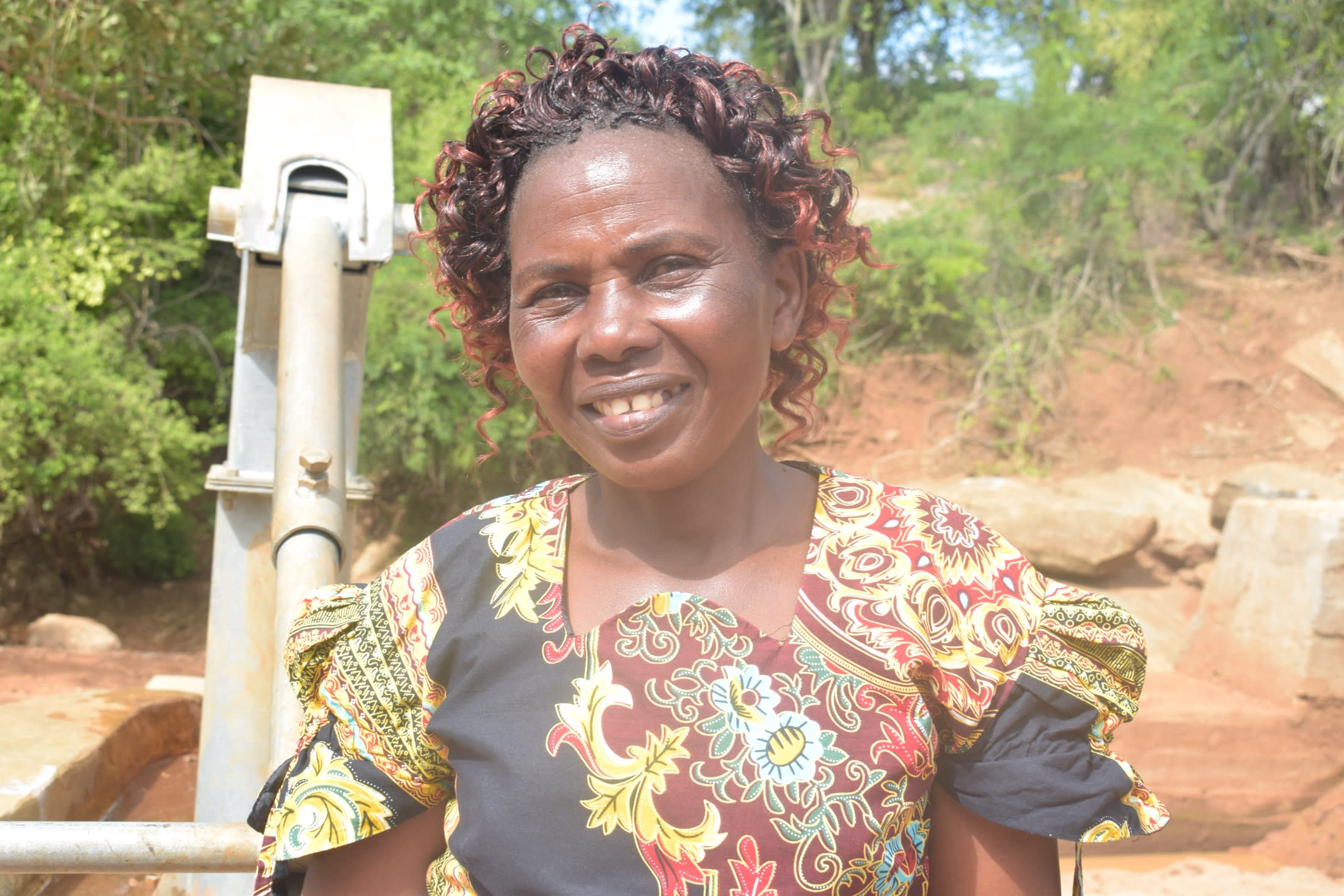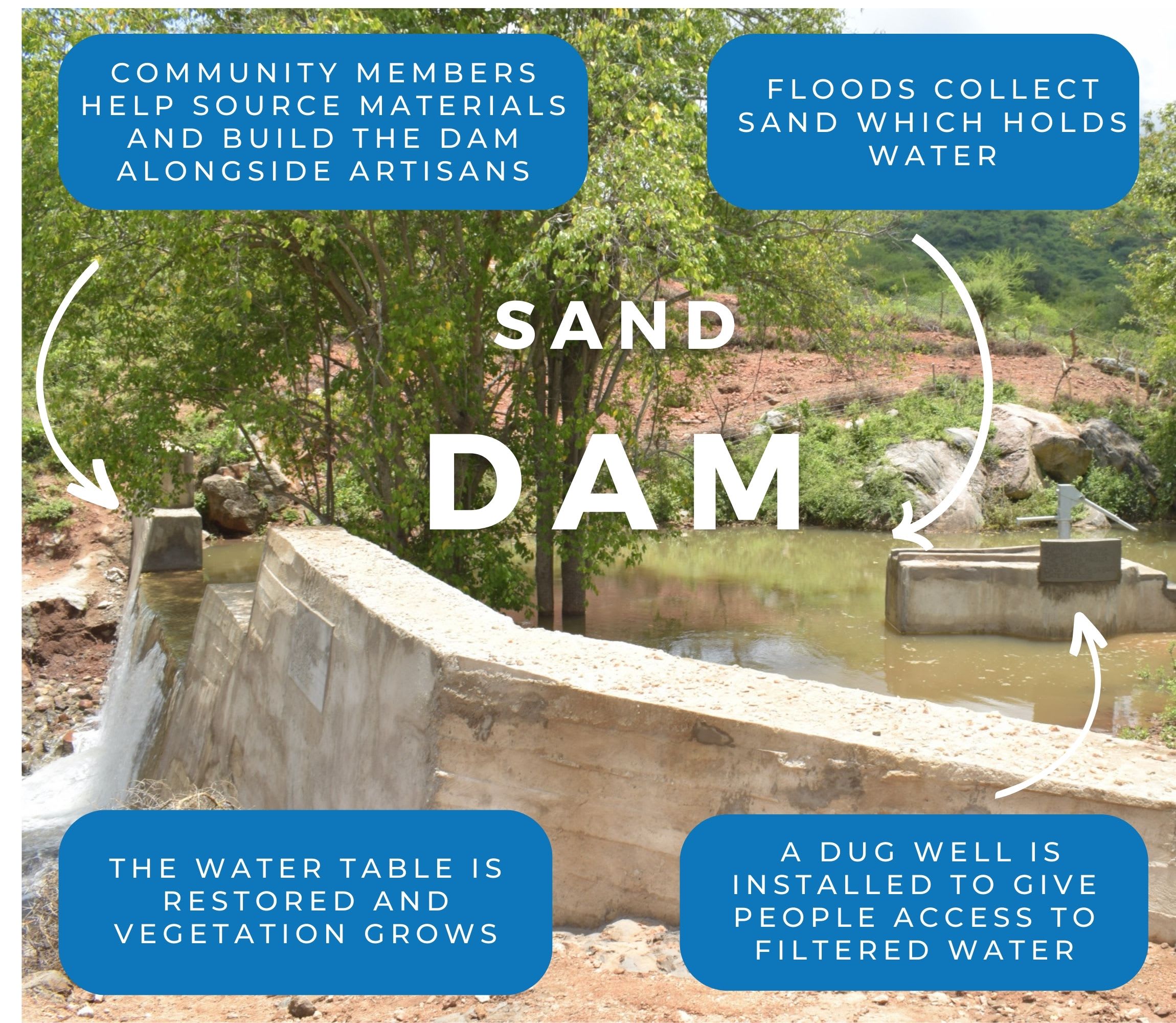Project Updates
August, 2020: Through Their Eyes: COVID-19 Chronicles with Grace Muimi
This post is part of a new series by The Water Project meant to highlight the perspectives and experiences of the people we serve and how the COVID-19 pandemic is impacting them. We invite you to read more of their stories here.
Our team recently visited Waita Community to conduct a COVID-19 prevention training (read more about it below!) and monitor their water point. Shortly after, we returned to check in on the community, offer a COVID-19 refresher training, and ask how the pandemic is affecting their lives.

Grace Muimi
It was during this most recent visit that Grace Muimi shared her story of how the coronavirus has impacted her his life.
Field Officer Lilian Mutheu met Grace outside her home to conduct the interview. Both Lilian and Grace observed social distancing and other precautions throughout the visit to ensure their health and safety. The following is Grace's story, in her own words. / Their questions and answers have been edited for clarity and length.
What is one thing that has changed in your community since the completion of the water point?
"Water has been available for hand washing, cooking, and all domestic issues. During this COVID 19 pandemic, we have been advised to avoid crowded places. If we didn't have this project, we'd be queuing at other water points, and it is risky to contract the virus."

Grace at the well.
How has having a clean water point helped you through the pandemic so far?
"Water is available for regular hand washing as advised by the ministry of health, drinking, and general cleaning."
Since the outbreak of COVID-19 in Kenya, has fetching water changed for you because of restrictions, new rules, or your concerns about the virus?
"Yeah, things have changed because we have to keep a social distance at the water points. We used to meet there as groups and chat for a while before leaving. Nowadays, we rarely meet, and we don't even know how things are going on in our area."
How has COVID-19 impacted your family?
"My family is highly affected since I have five kids, two are affected because they are candidates, and they hoped to finish their high school this year, and they are now almost discouraged. They no longer have the motivation to read because they are not sure if this year they will go back to school. I am afraid the kids will not perform well in their exams."
What other challenges are you experiencing due to the COVID-19 pandemic?
"We were planning to do a wedding before the pandemic with my husband in May, but tables turned, and here we are. We cannot have a wedding because the churches were closed. My husband lost his job, and he's currently at home."

Handwashing at COVID training
What hygiene and sanitation steps have you and your community took to stop the spread of the virus?
"In the projects we work on, we make sure that we have a tippy tap and soap for handwashing during the activities we do here."
What restriction were you most excited to see lifted already?
"Churches being open and public transport."

Grace fetches water.
What restriction are you still looking forward to being lifted?
"I'm looking forward to Schools to be fully operational."
When asked where she receives information about COVID-19, Grace listed the radio and our team's sensitization training.
What has been the most valuable part of the COVID-19 sensitization training you received from our team?
"The team reminded us of social distancing and proper handwashing."

May, 2020: COVID-19 Prevention Training Update at Karuli Community
Our teams are working on the frontlines of the COVID-19 pandemic. Join us in our fight against the virus while maintaining access to clean, reliable water.

We are carrying out awareness and prevention trainings on the virus in every community we serve. Very often, our teams are the first (and only) to bring news and information of the virus to rural communities like Karuli, Kenya.
We trained community members on the symptoms, transmission routes, and prevention of COVID-19.
Due to public gathering concerns, we worked with trusted community leaders to gather a select group of community members who would then relay the information learned to the rest of their family and friends.

We covered essential hygiene lessons:
- Demonstrations on how to build a simple handwashing station
- Proper handwashing technique
- The importance of using soap and clean water for handwashing
- Cleaning and disinfecting commonly touched surfaces including at the water point.

We covered COVID-19-specific guidance in line with national and international standards:
- Information on the symptoms and transmission routes of COVID-19
- What social distancing is and how to practice it
- How to cough into an elbow
- Alternative ways to greet people without handshakes, fist bumps, etc.
- How to make and properly wear a facemask.

During training, we installed a new handwashing station with soap near the community’s water point.
Due to the rampant spread of misinformation about COVID-19, we also dedicated time to a question and answer session to help debunk rumors about the disease and provide extra information where needed.
Water access, sanitation, and hygiene are at the crux of disease prevention. You can directly support our work on the frontlines of COVID-19 prevention in all of the communities we serve while maintaining their access to safe, clean, and reliable water.

February, 2018: Karuli Community Sand Dam Complete
We are very excited to report that, thanks to your willingness to help, the members of the Kyeni kya Karuli Self-Help Group and their families in Kenya have a new source of safe, clean water. A new sand dam has been constructed on a local river, which will build up sand to raise the water table and naturally filter water. The self-help group members have also attended a review on sanitation and hygiene, and plan to share what they learned with their families and neighbors. You made it happen, now help keep the water flowing! Join our team of monthly donors and help us maintain this sand dam and many other projects.
The report below from our partner gives the latest details of the project. We also just updated the project page with new pictures. Make sure to click on the "See Photos & Video" tab to check them out!
Project Result: New Knowledge
Since we've been working with this area for a few years, our field officers made a visit to different households in the community to see how they're doing with hygiene and sanitation. This allowed us to plan a review training to go over what people still need to work on. This hygiene and sanitation review was held at Jennifer Mwanza's homestead, and was well-attended with most of the group members there.

We reviewed how to keep latrines clean, treating water, practicing personal hygiene, and disposing of trash properly among many other topics. There was still one group member who hadn't built a latrine on her home, so we reviewed its importance and encouraged her neighbors to help her.
We also introduced the production of soap for both personal use and sale. They've already made dozens of liters that they plan to sell in the local market to fund the group's farming efforts.

Mrs. Mwanza said, "The training was good because I have understood everything that has been trained and what was trained last year. This is because we are always taken through slowly, step by step. Initially, we didn't understand a lot of hygiene details that were taught to us. Like for instance, our area is known for open defecation; but we now understand very well that its very important for every homestead to have a latrine and outside our latrine, we should have a tippy tap. We have been able to install all other sanitation infrastructures, as well as improving on our hygiene behaviors. Today's training was exceptional. We have added knowledge on soap-making on top of what we already knew. This knowledge will enable us improve on hygiene like for instance, use the soap for hand-washing, cleaning our utensils and for income in our group and at personal level."

Mrs. Jennifer Mwanza
Project Result: Sand Dam
The community members collected all of the local materials like rocks and sand that they needed to start construction. They also provided unskilled labor to support our artisans. Out of the entire process, collection of the raw construction materials takes longer than the actual construction. For a super large sand dam, material collection could take up to four months!
Before actual construction started, siting and technical designs were drawn and presented to the Water Resources Management Authority (WRMA) and the National Environmental Impact Assessment (NEMA) for approval. Once approved, we had to start with establishing firm bedrock foundation for the sand dam wall. In the absence of good bedrock, excavation is done up to a depth at which the technical team is satisfied that the ground is firm enough to stop seepage.
Then mortar (a mixture of sand, cement and water) is mixed and heaped into the foundation. Once there is enough mortar to hold rocks available, rocks are heaped into the mortar. Barbed wire and twisted bar is used to reinforce the mixture. Once the foundation is complete, a skeleton of timber is built to hold the mortar sludge and rocks up above ground level. The process is then repeated until a sufficient height, width and length is built up. Then, the vertical timber beams are dismantled and the dam is left to cure.

The finished height is 4.5 meters and the length is 25 meters. As soon as it rains, the dam will begin to build up sand and store water. With this water, the surrounding landscape will become lush and fertile. However, it could take up to three years of rain (Because sometimes it only rains once a year!) for this huge sand dam to reach maximum capacity. Sand dam construction was simultaneous to construction of a hand-dug well which gives locals a safe method of drawing water. As the sand dam matures and stores more water, more of it will be accessible as drinking water from the well. To see that hand-dug well, click here.

Mrs. Mwanza was willing to hold training at her home and to tirelessly work on this sand dam because she knows the change that water brings. "Personally, I have a kitchen garden at home so I don't buy vegetables from the market. Our animals also can drink water from the dam. Initially we used to walk for many hours and walk for long distances to look for water but now that's a challenge that has fully been solved. Diseases caused by drinking dirty water have been minimized because we no longer share drinking water sources with animals. The knowledge that we have gained from the WASH training has been very helpful in keeping animals away from our water sources and also treating our drinking water," she shared.
January, 2018: Karuli Community Sand Dam Underway
Karuli Community in Kenya will soon be transformed by the construction of a sand dam. The dam will build up sand and eventually catch rainwater to help raise the water table in the area, providing clean water and helping with agriculture. We just posted an initial report including information about the community, maps, and pictures. We’ll keep you posted as the work continues!


 Sand Dam
Sand Dam
 Rehabilitation Project
Rehabilitation Project































